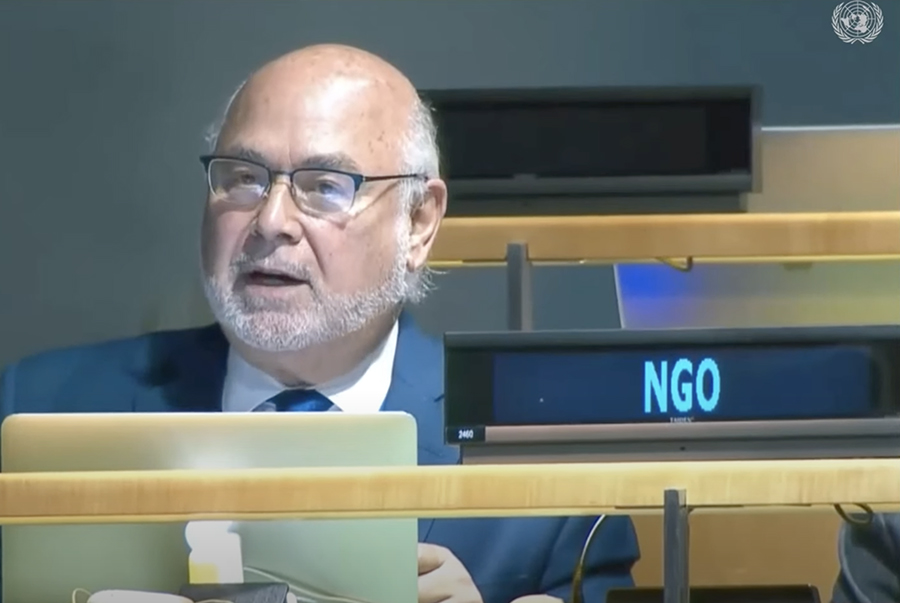“Human Security and the Imperative of Fulfillment of NPT Promises” — Presented by GSI President Jonathan Granoff on August 5, 2022, at the United Nations General Assembly Hall, United Nations, New York City, as part of the 10th Nuclear Nonproliferation Treaty Review Conference
Watch the video presentation here
Your Excellencies,
It is a great honor to address Diplomats and Leaders of all but four of the world’s nations. Your responsibility to utilize the skills of diplomacy — dialogue, law, compromise, and mutual respect — all in the interest of saving the planet from the scourge of nuclear annihilation, and your efforts to find common interests and security for each nation and us all is inadequately recognized and appreciated. However, we here today share with you an awareness that we are all possible victims of nuclear annihilation caused by a miscalculation, mistake, human or computer error, or even the madness or irrational passion of an individual. The very future of humanity depends on your success.
The promises made pursuant to Review Conferences of the Nuclear Nonproliferation Treaty contain an abundance of risk reducing, security enhancing steps that if actualized would have dramatically improved the relationship amongst nations that today are either implicitly or explicitly threatening the use of nuclear weapons.
Diplomats who have worked hard since the 1995 indefinite extension of the Treaty have forged political agreements pursuant to legal nonproliferation and disarmament duties that have not been fulfilled. In fact, they have largely been ignored by decision makers in capitals of states with nuclear weapons.
Some commitments have become dated. Some remain relevant. However, the good faith efforts at capitals of the nuclear weapons states to fulfill these commitments did not overcome the passion for the pursuit of military advantage, despite recognized disarmament obligations, and despite claims of pursuing strategic stability. Modernization and new uses of nuclear weapons has occurred. The pursuit of security through military expenditures since 2000 has exceeded $30 Trillion. Nuclear weapons remain a significant pillar in military doctrine, stimulate fear and thus more military expenditures.
The nuclear arsenals institutionalize adversity. Even though it is recognized that a nuclear war cannot be won, even though recent climate science informs us that a small percentage of the world’s arsenal, even by one nation, would throw millions of tons of soot into the stratosphere destroying the agricultural base of civilization, even though numerous near uses have occurred by computer and human error, we have not made appropriate progress to fulfill existing disarmament promises and in fact adversity based on nuclear threats has only increased.
Ignoring past pledges puts the very fabric of civilization at risk. Pacta Sunt Servanda, promises must be kept, is the foundation of peace amongst nations. Corrode this principle, treat agreements as if they were mere aspirational poetry results in raw power becoming the currency of communication. Destroy good faith compliance with agreements, says Aristotle, and you destroy the intercourse of humanity. In the nuclear age this is not an option.
We have heard numerous risk reducing, nonproliferation, and disarmament proposals from nations and civil society already in this conference. They reinforce one another and are not adverse. But no matter what is agreed in this process we cannot permit it to be marginalized by military nationalistic myopia and the mistaken belief that simply more capacity to destroy will bring more peace. We must prevail in changing the policies and economic allocations of the nuclear weapons states.
We are faced with a paradox. The more nuclear weapons are improved, modernized, made usable the less security is obtained. Yet, this is what is being done. This is irrational and unrealistic.
Let us begin with a new realism. Destroying the regenerative processes of nature, putting the health of the oceans at risk, failing to adequately protect the climate, the diversity of species, and rainforests are matters of existential magnitude for humanity.
Nuclear weapons present a hurdle to the cooperation necessary to address the global threats of the 21st Century.
Human Security emphasizes our common humanity, and the actual way people live. Common security is the multilateral expression of human security amongst nations.
Our choice is very clear. The commitments made in the past wherever possible must be reaffirmed and we must have open minds to receive new proposals. We cannot go backward.
Going forward requires a realistic approach to security based on the science of today that informs us clearly of the need to cooperate and approach global threats with solidarity. It is time to heed the words of Albert Einstein and Bertrand Russell in their famous Manifesto:
We appeal as human beings to human beings: Remember your humanity and forget the rest. If you can do so, the way lies open to a new Paradise; if you cannot, there lies before you the risk of universal death.
It is high time that the diplomats of the nations with nuclear weapons commence focused, committed, thorough negotiations to fulfill their legal obligation to eliminate these horrific devices.
Our commitment is to help ensure that the diplomatic agreements forged in these quarters become applied policies and overcome fear and threats with reason and humanity.
Sen. Alan Cranston reminds that nuclear weapons are unworthy of civilization. I want to remind us that successful diplomacy is necessary for civilization. Please do not let us down.
Jonathan Granoff is the President of the Global Security Institute, a representative to United Nations of the World Summits of Nobel Peace Laureates, a former Adjunct Professor of International Law at Widener University School of Law, and Senior Advisor to the Committee on National Security American Bar Association International Law Section.








